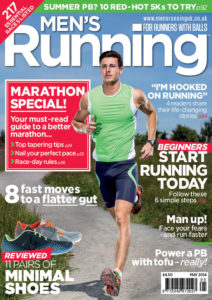 I’ve just started writing for Men’s Running magazine. Here’s a sneaky peak of the article prior to it’s release at the end of the month…
I’ve just started writing for Men’s Running magazine. Here’s a sneaky peak of the article prior to it’s release at the end of the month…
Recovery nutrition
How can runners maximise their recovery with the foods they eat?
Eating clean and natural food is at the foundation of health as I see it. Hippocrates once said “let food be thy medicine and medicine be thy food” and as runners, we can either help or hinder our performance and recovery with the food choices we make.
Have you ever woken up after a big carb-laden meal the night before and felt groggy? This is just one example of how food can affect our performance or our motivation to actually get out the door and do the running session! Therefore finding the right balance of nutrients is important if we want to do well.
Protein is essential for post-exercise recovery and along with fast-acting carbohydrate, it helps repair microscopic tears in muscle tissue. This is a by-product of effective exercise and during the repair process, muscles are built stronger.
Protein’s role in exercise recovery is affected by how quickly you can refuel, therefore it is best to consume protein and fast-acting carbohydrate as soon as possible after working out for prime muscle recovery.
If you’re not able to eat a meal or recovery shake within 15 minutes, all is not lost as anything up to an hour post workout will ensure your body receives what it needs at the right time.
Examples of combinations that include both protein and fast-acting carbohydrate are; natural bio live yoghurt and fruits like bananas, melons, mangoes and pineapples. The tropical fruits tend to be higher in sugar and are ideal post workout for optimal replenishment of glycogen levels.
Another option would be a homemade smoothie including a natural protein powder, unsweetened almond or coconut milk, banana and strawberries.
Cottage cheese with fresh pineapple or red grapes makes a handy, portable snack that you can pack in your gym bag or have ready-prepared in the fridge for when you get back from your run.
So if protein and carbohydrate are ideal post workout, what about fat? This is one macronutrient, although essential to our diet, is not helpful in significant amounts pre or post workout.
Fats slow the absorption rate of protein and carbohydrate, which is ideal if you’re looking for a balanced meal that will keep you feeling fuller for longer but with running, what we’re concerned with most is digesting and absorbing our food in plenty of time before workouts so that performance isn’t compromised by delayed digestion.
Post workout, fat interferes with our key nutrient requirement and therefore it’s more effective for both performance and recovery if we keep fat out of our pre and post workout meals and include essential fats in meals at other times of the day.
When selecting foods for energy and recovery, a good rule of thumb is to go for foods that have a vibrant colour, for example, blueberries, tomatoes, spinach, oranges and sweet peppers. The colour is a good indicator of abundant amounts of vitamins, minerals and phytonutrients. Combined with protein such as lean meat, fish, eggs and pulses, this ensures a plentiful amount of quality nutrients.
5 foods to aid recovery
Turkey is high in lean protein, B vitamins and tryptophan which aids restful sleep. It is also low in fat which makes it ideal post workout and a few hours before bedtime.
Sweet potato is abundantly rich in beta carotene, vitamin C, complex carbohydrate and fibre. Eating carbohydrate like sweet potato, ensures glycogen levels are topped up and it keeps us feeling energised and satiated.
Apples are a great source of fibre, antioxidants and flavonoids and the water content helps with hydration.
Celery is a rich source of sodium bound with other vitamins, minerals and fibre. Sodium is a key mineral in isotonic drinks.
Cucumber is a source of silicon, fibre and having a 96% water content, it works well when you combine equal amounts of apple, celery and cucumber in a fresh juice or smoothie post workout
Did you know?
You can make a homemade isotonic drink with 250ml fresh apple juice, 250ml water and a pinch of Himalayan crystal salt to consume during training sessions lasting more than 1 hour. Just fill up a hydration pack and start drinking after 1 hour, in intervals of approximately 15 minutes.


